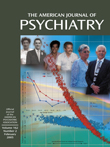Omega-3 Fatty Acids and Depression
To the Editor: In a recent issue of the Journal, Reeta Hakkarainen, M.B., et al. (1) failed to find an association between baseline intake of fish or dietary omega-3 polyunsaturated fatty acids and the risk of self-reported depressed mood or hospitalization for major depression during the 9-year follow-up of a prospective interventional cohort of male Finnish smokers (the Alpha-Tocopherol, Beta-Carotene Cancer Prevention Study). These results are conflicting with other studies (2–4), in particular, a cross-sectional study in Finland reporting a higher risk of depression in infrequent fish consumers (2). Two important points, however, were missed in the study by Dr. Hakkarainen et al.
First, clinical trials have suggested the antidepressive effects of long-chain omega-3 polyunsaturated fatty acids, especially eicosapentaenoic acid (5). Dietary alpha-linolenic acid can be converted to eicosapentaenoic acid but only at a very low rate. Main direct sources of long-chain omega-3 polyunsaturated fatty acids are fish, seafood, and fish oil. Was fish oil supplement use recorded in the Alpha-Tocopherol, Beta-Carotene Cancer Prevention Study cohort?
Second, systemic oxidant stress due to tobacco use decreases blood polyunsaturated fatty acids, especially omega-3 long-chain polyunsaturated fatty acids, and increases lipoperoxidation products (6). Supplemental vitamin E can partly counteract these effects (6). Thus, the effects of omega-3 polyunsaturated fatty acids in smokers possibly depend on their antioxidant status and antioxidant intake. Because the subjects in the Alpha-Tocopherol, Beta-Carotene Cancer Prevention Study were given supplements of either vitamin E, beta-carotene, both, or a placebo during the follow-up, the presence and direction of an association between omega-3 long-chain polyunsaturated fatty acid intake and depression can depend on the intervention group. Therefore, it would perhaps be worth looking at the possible interaction of omega-3 fatty acid intake with vitamin E and/or beta-carotene intervention before concluding an absence of association with depression. The size of the sample (8,612 subjects with depressed mood) allows this more detailed analysis.
1. Hakkarainen R, Partonen T, Haukka J, Virtamo J, Albanes D, Lönnqvist J: Is low dietary intake of omega-3 fatty acids associated with depression? Am J Psychiatry 2004; 161:567–569Link, Google Scholar
2. Tanskanen A, Hibbeln JR, Tuomilehto J, Uutela A, Haukkala A, Viinamäki H, Lehtonen J, Vartiainen E: Fish consumption and depressive symptoms in the general population in Finland. Psychiatr Serv 2001; 52:529–531Link, Google Scholar
3. Silvers KM, Scott KM: Fish consumption and self-reported physical and mental health status. Public Health Nutr 2002; 5:427–431Crossref, Medline, Google Scholar
4. Tiemeyer H, van Tuijl HR, Hofman A, Kiliaan AJ, Breteler MMB: Plasma fatty acid composition and depression are associated in the elderly: the Rotterdam Study. Am J Clin Nutr 2003; 78:40–46Crossref, Medline, Google Scholar
5. Peet M, Horrobin DF: A dose-ranging study of the effects of ethyl-eicosapentaenoate in patients with ongoing depression despite apparently adequate treatment with standard drugs. Arch Gen Psychiatry 2002; 59:913–919Crossref, Medline, Google Scholar
6. Brown KM, Morrice PC, Duthie GG: Erythrocyte membrane fatty acid composition of smokers and non-smokers: the effects of vitamin E supplementation. Eur J Clin Nutr 1998; 52:145–150Crossref, Medline, Google Scholar



